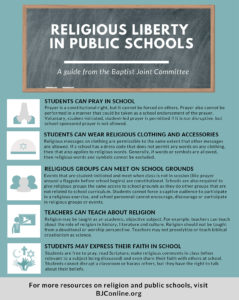Religious Liberty in Public Schools
This handout serves as a guide for understanding the rights and constitutional limitations when it comes to religion in public schools. The text is below:
Students can pray in school.
Prayer is a constitutional right, but it cannot be forced on others. Prayer also cannot be performed in a manner that could be taken as a school endorsement of the prayer. Voluntary, student-initiated prayer is permitted if it is not disruptive, but school-sponsored prayer is not allowed.
Students can wear religious clothing and accessories.
Religious messages on clothing are permissible to the same extent that other messages are allowed. If a school has a dress code that does not permit any words on any clothing, then that also applies to religious words. Generally, if words or symbols are allowed, then religious words and symbols cannot be excluded.
Religious groups can meet on school grounds.
Events that are student-initiated and meet when class is not in session (like prayer around a flagpole before school begins) are constitutional. Schools also are required to give religious groups the same access to school grounds as they do other groups that are not related to school curriculum. Students cannot force a captive audience to participate in a religious exercise, and school personnel cannot encourage, discourage or participate in religious groups or events.
Teachers can teach about religion.
Religion may be taught as an academic, objective subject. For example, teachers can teach about the role of religion in history, literature and culture. Religion should not be taught from a devotional or worship perspective. Teachers may not proselytize or teach biblical creationism as science.
Students may express their faith in school.
Students are free to pray, read Scripture, make religious comments in class (when relevant to a subject being discussed) and even share their faith with others at school. Students cannot disrupt a classroom or harass others, but they have the right to talk about their beliefs.
Visit www.BJConline.org for more information.
The Baptist Joint Committee’s website has downloadable issue guides for parents and teachers.





